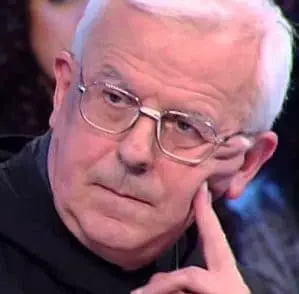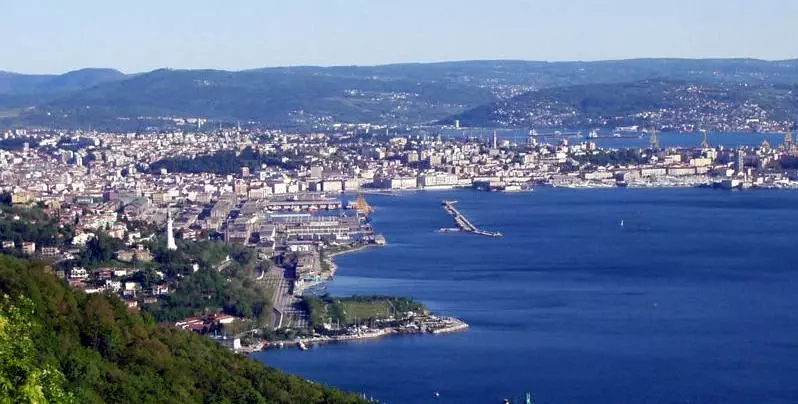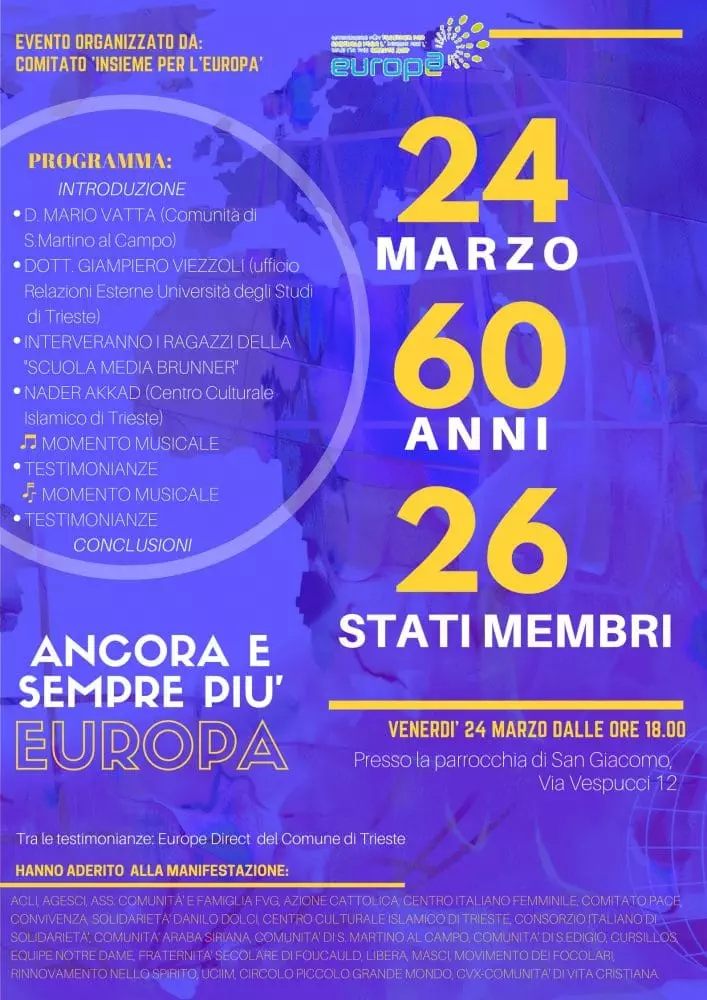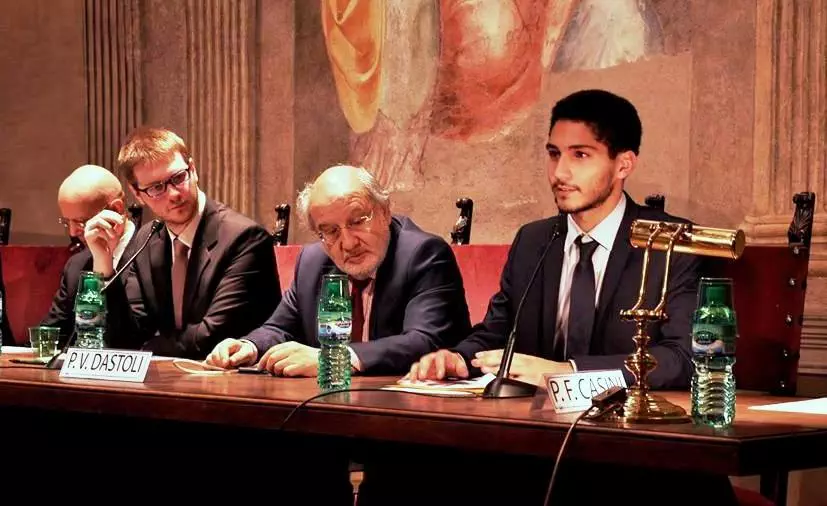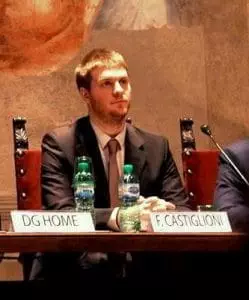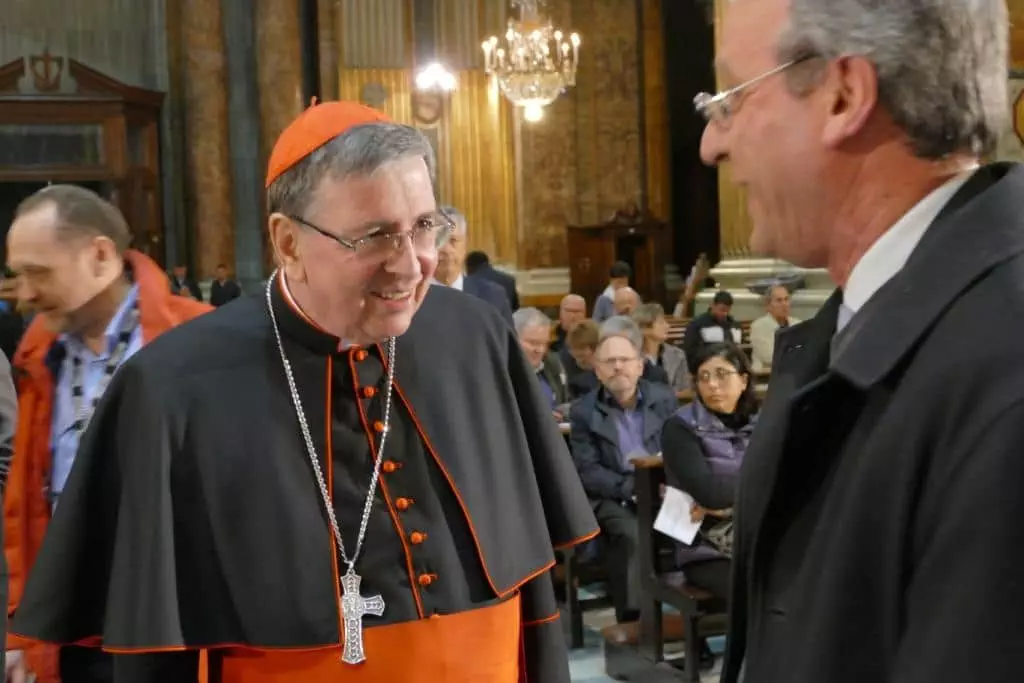
by Claudia Di Lorenzi | Apr 3, 2017 | 2017 | 60th Treaties of Rome, Experiences, reflections and interviews, Italy, News
Ecumenical Prayer Vigil for Europe, 24th March 2017 – Interview with Card. Kurt Koch, President of the Pontifical Council for Promoting Christian Unity
Your Eminence, this Vigil prayer which has brought together different Christian denominations shows that unity in diversity is possible. What sort of example can an evening such as this offer to a Europe still divided and torn on basic issues?
“This Prayer evening has been organised by Movements belonging to different Churches: there is a great variety and diversity present, however there is also unity, all of us are together – for Europe. This reconciliation between unity and diversity is very important for Europe, which is called to embody unity without negating diversity. In fact, there needs to be a greater understanding of diversity in order for all of countries to contribute effectively to building unity”.
One of the objectives of this group which unites different Christian Movements is to identify so-called “signs of the time”, that is to say, those signals which at any given time in human history indicate the direction in which humanity is advancing, however slowly towards unity. Can you yourself discern such signs?
“The greatest challenge of today is related to the influx of refugees. The challenge is for Europe to welcome them, to be open to them. There is a saying: “If I only know England I don’t really know England”, of course this saying is equally valid for any other country, like Italy or France, etc. So, realising that the other is not my enemy, is a good thing: once this has been established, everything will proceed well”.
Pope Francis stressed that peace is achieved through integration, dialogue and work, and that for Europe work is, on the political level, a priority. What is your view in this regard?
“It is fundamental that everyone be able to access employment. This is a big challenge because it concerns the very dignity of the human person. Within the working environment then what matters is collaboration, that there be no contempt between co-workers… So, the opportunity for everyone to access dignified employment clearly contributes to the unity of Europe”.
Claudia Di Lorenzi
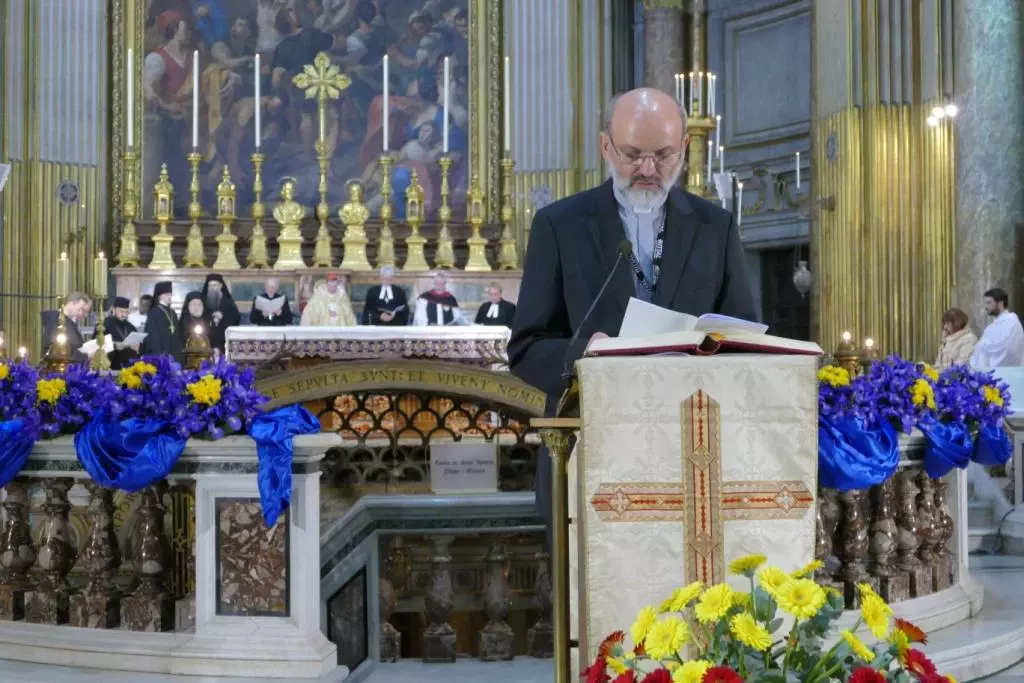
by Claudia Di Lorenzi | Apr 3, 2017 | 2017 | 60th Treaties of Rome, Experiences, reflections and interviews, Italy, News
Fr. Heinrich Walter, Responsible for International Coordination of the Schoenstatt Movement, on the occasion of the Ecumenical Prayer Celebration in Rome 2017
In your view, what contribution can Pope Francis offer to the building of a Europe in which there is more solidarity and more inspiration drawn from Christian values?
“Being of Argentinian origin, I believe the Pope sees Europe differently than we do, more objectively, and understands that Europe is frightened and as a result is lacking vitality. Pope Francis is enthusiastic and understands very well that what the world as a whole needs its renewal.”.
What witness can Christian Churches united in their diversity offer Europe?
“In this Europe in crisis countries lack the ability to offer solutions based on their own individual resources. Some countries have suffered excessive pressure due to the refugee emergency situation. What is needed is an alliance among the countries of Europe, so that each can offer a contribution freely to an overall solution”.
Claudia Di Lorenzi
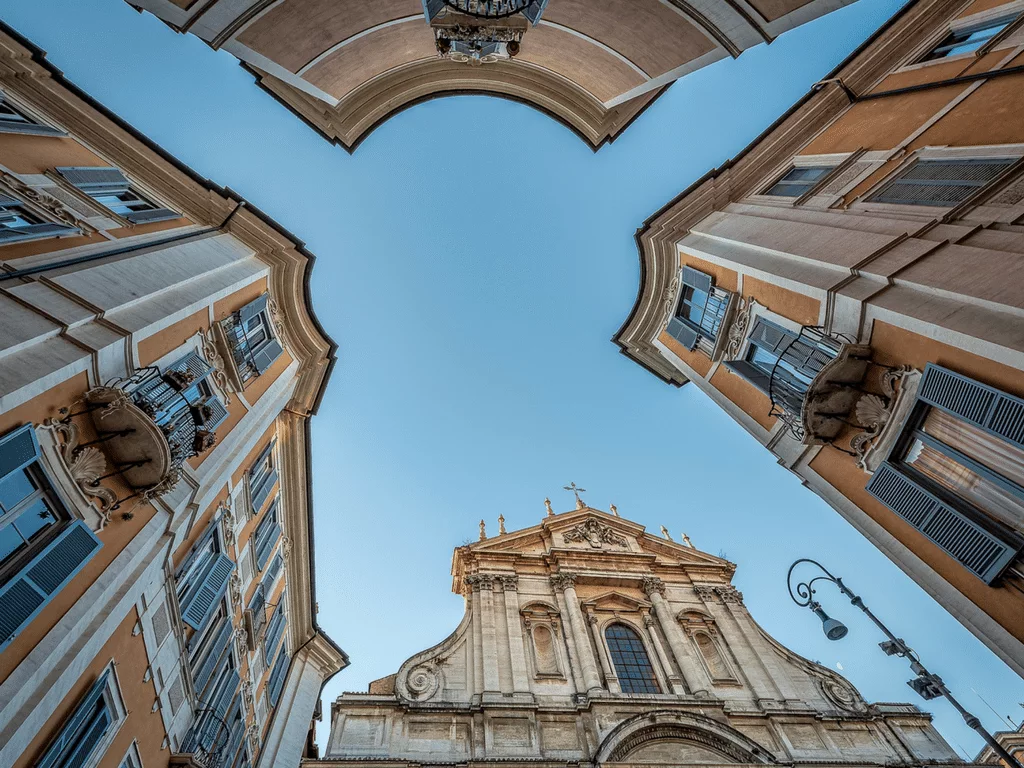
by TogetherforEurope | Mar 23, 2017 | Experiences, reflections and interviews, News
The contribution of Religious Orders and Institutes towards unity in Europe
During the times of the Roman Empire, Europe experienced a period characterised by a certain type of unification. This was a fragile unity forcefully imposed by “Roman legions”. With the fall of the Roman Empire, Europe found itself once again fragmented, with ethnic and cultural differences reasserting themselves as each of its peoples sought to restate their own sense of identity. By the 5th century, Europe was full of different rival groups.
During this period and in centuries to follow, the presence of certain men and women guided by the Spirit, inspired in the peoples of Europe new ideals and universals values, mostly rooted in the Judeo-Christian heritage. They were values and ideals that brought European peoples into dialogue, sharing their respective riches and in this way generating a new, unitary social and cultural fabric for the Continent.
In a conference, a few years ago, Cardinal Walter Kasper said: “Saints like Martin, Benedict, Boniface, brothers Cyril and Methodius, Adalbert, Bernard, Francis, Dominic and many others, moulded the history of Europe. Through these saintly men and countless saintly women, the Church made a precious contribution to the unity and the sense of identity of Europe”.
These individuals gave rise to new spiritualities, spiritual movements, religious orders and centres of cultural and social works, that helped the peoples of Europe to gradually develop an identity based on shared values.
The first big charismatic order originated from Benedict of Nursia (Italy, 480-547). Benedictine Monasticism, brought about by Benedict both in Africa and in the East as well as in the West, was in its many historical expressions a determining factor for the evangelisation of the Continent whilst contributing to the formation of European medieval culture. In short, it played a crucial part in establishing the dialogue between values of the Roman civilisation, Judeo-Christian values and those of the so-called “barbarian” cultures that were introduced to the Continent by the peoples of the North and East in the centuries to follow.
The religious brothers of the order of Saint Benedict with their widely disseminated and sizable abbeys, established centres of spirituality, which also served as centres of culture, human empowerment and social and economic progress, putting themselves mostly at the service of the poor and marginalised.
In the 11th century in Eastern Europe, Cyril and Methodius, two monks of Greek origin, having evangelised peoples of Eastern Europe, started a process which, it can be argued, led to the foundation of the Slavic culture. The breakthrough of these brothers from Salonica (Greece) consisted in the creation of a new alphabet, whilst they were in contact with Western Greco-Roman culture; in this way, they made a decisive contribution to what would become the literature and culture of Slavic nations.
Between the 11th and the first half of the 12th century, other charismatic individuals and great cultural figures emerged. One of these, Bernard of Clairvaux, hailing from the tradition of Benedictine Monasticism founded a new movement, the Cistercian order.
In the 13th century the Mendicant Friars emerged giving rise to many other charismatic movements. These originated from charismatic figures in individual nations, fast developing into supra-national movements spreading all over the Continent and in turn to the rest of the world.
Among these the Dominican movement stands out, founded in Spain by Dominic de Guzman (1170-1221) and the Franciscan movement, which itself originated in Italy with Francis of Assisi (1182-1226). Religious movements whilst rooted in deep spirituality were able to inspire and promote many aspects of human culture and knowledge. They developed theology, philosophy, literature, sciences, arts. At the time and in the centuries to follow, every European university, would number among its lecturers and pupils, friars from the Mendicant orders.
With the arrival of Humanism and the Renaissance, powerful nations were established. This process was contributed to in a decisive way both by established charismatic movements as well as new charisms which grew and spread.
Many new religious orders were established in the 16th and 17th centuries. Ignatius of Loyola and the Jesuit order; Teresa of Avila and John of the Cross and the Carmelites in Spain; the Brothers of Mercy of John of God who cared for the sick; in France, Vincent de Paul and the Sisters of Charity; Francis de Sales, John Baptist de La Salle known for the formation of young people and for the setting up of schools accessible to all; Philip Neri with the Oratory, in Italy, Girolamo Emiliani, Cajetan of Thiene, Camillo de Lellis who operated in the hospitals, and so on. At around the same time the Capuchin reform emerged from the Franciscan tradition and in Germany the great reform of Martin Luther took place.
Many other new spiritualities made a key contribution to the cultural, social and economic identity of modern Europe. Each charism was born with a strong spiritual identity, while sensitive and open to issues, challenges, social and human needs of peoples and individuals. This allowed access to culture, health care, housing, human rights, economy and dignified human life to an ever-growing number of European citizens.
The same phenomenon can be seen in the 18th and 19th centuries. Despite the abolition of religious orders imposed first by Napoleon and later by several European States, countless religious institutes and orders were established. In the 19th century we cannot go without mentioning Don John Bosco and the Salesians (Turin, Italy), John Benedict Cottolengo and Joseph Cafasso, who looked after the sick and the marginalised; in England, the contribution of bishop John Henry Newman, and so on.
In the 20th century Europe, besides the establishment of new religious orders such as those set up by Don James Alberione, Don Luigi Orione, Mother Teresa of Calcutta, Edith Stein, Maximilian Kolbe and others, saw the beginnings of many other expressions of charismatic life which manifested themselves as vast lay ecclesial movements. Each with its own strong spiritual identity, but also with a great sensitivity to the dramatic challenges brought to our Continent by modernity.
Europe would be poorer and more fragile were it not for the contribution offered in the past by orders and religious institutes and today by the wealth of ecclesial movements which have emerged within different Churches and Christian Communities.
These spiritual and charismatic forces, whilst born in precise geographical locations, have spread beyond national borders, offering in this way a powerful and decisive contribution to the constituting of a united, strong, free, sympathetic and brotherly Europe.
Fr Egidio Canil, Sacro Convento of the Franciscans in Assisi, Italy 

by Silvano Magnelli | Mar 17, 2017 | 2017 | 60th Treaties of Rome, Experiences, reflections and interviews, Italy, News
With the 60th anniversary of the Treaties of Rome approaching, people in European cities gather to give witness to a Europe focused more than ever on dialogue and brotherhood. Trieste is one of them.
60 years ago, the Founding Fathers of Europe took the first steps on a path which would lead to greater European unity against the stench of blood and smoke and the rubble of a war driven by nationalist and racist extremism in Europe and which subsequently spread throughout the world. Only a comprehensive reformation including international, political, civic, economic, cultural and religious relationships between peoples and communities would be capable of paving a new way to help Europeans to emerge from a culture of widespread hatred.
60 years after the historic days which marked the signing of the Treaties of Rome in 1957, we re-affirm European unity as the indispensable means to maintaining peace and peaceful co-existence. Despite the failings, undeniable gaps, rigidities, bureaucratic excesses, misunderstandings and serious inequalities of the European Union, the advantages of the re-composition of Europe largely prevail. We must strive to continue on and to perfect the path we have undertaken, rather than obliterate it, as called for by nationalist and separatist voices, something that would only serve to draw us back into peace-threatening situations.
More than four million young European students have benefited from the Erasmus program in terms of formation and knowledge. Equally significant has been the number of European professionals, who have taken advantage of the freedom afforded by mobility within the EU which has facilitated the acquisition of expertise, as well as increased cultural, technological, commercial and economic exchange. Many young people have put themselves at the service of other European countries to their own, through the European Voluntary Service. A broad scholarly exchange has been made possible thanks to collaborations between universities. Improvements across a range of areas such as occupational and environmental safety, health care, tourism and culture, have been achieved through European directives that are reflected in national legislation. Religious communities have also set in motion processes for unification and integration extending to all Christian Churches and every religion.
We cannot afford to give up such benefits. Instead we must intensify and uphold this model for the sake of all European peoples who have suffered enough. In order to re-affirm this commitment, we will meet on 24th of March at 6pm in St. James’ Oratory (Oratorio di S. Giacomo) in Trieste for an evening of celebration marking this 60th anniversary. Promoting the event are approximately twenty associations, movements and communities, that all form part of a broader initiative called Together for Europe, which for the last 17 years has been active in many European cities, including Trieste. Together for Europe brings together the faithful of different religions, non-believers and people of good will who, rather than conflict seek peace and encounter. This will be an evening of reflection, brotherhood and celebration motivated by our own awareness of the urgent need to rediscover the importance of coming together in solidarity.
For the Coordination team of Together for Europe for Trieste, Italy
Silvano Magnelli
Photo Trieste: Di ryogt www.flickr.com/photos/ryogt/12980775/, CC BY-SA 2.0


by Federico Castiglioni | Feb 7, 2017 | 2017 | 60th Treaties of Rome, Experiences, reflections and interviews, News
The European dream has been, since its very beginning, an opportunity to overcome the mutual distrust and misconceptions which have existed between European peoples for centuries.
Throughout the history of European integration, issues pertinent to young people were often overshadowed by other, no less important topics, such as ecology or workers’ rights. This began to change in the 1990s and especially from 2000, when several educational youth exchange programmes including ‘Erasmus Mundus’ for university students as well as employment support programmes such as the Italian ‘Garanzia Giovani’ Projects were set up.
For young people, a united Europe is an enticing prospect. Many see it as an opportunity to form a broad community of men and women within which to seek points of contact between cultures and traditions stemming from a shared root. Europe represents an opportunity to work and travel, expand one’s horizons and transcend one’s own narrow national borders. Young people’s protests over Brexit calling for a review of the vote, expressed a strong desire to belong to a Europe with shared values.
Young people’s prevailing vision of Europe is not, however, entirely reassuring or optimistic. People of our generation are asking themselves whether the promises of material and spiritual wellbeing, equality and charity between European nations is being upheld. Currently, Italy has a youth unemployment of 40%. Whether the fault for this lies with successive Italian governments or with the European Union, the result is the same: a lack of jobs translates into a lack of dignity (as both Benedict XVI and Francis pointed out). The European reaction to the economic and fiscal crisis has been slow and insufficient and ended up only deepening inequality and causing more suffering. Whilst 5 or 6 years ago, no voices objected to the European project, today, many are tempted to give up on what appears to be a futile dream. Young people are fully aware of these difficulties. As shown by voting preferences in Italy, Spain and France, the so-called “Erasmus generation” has lost some of its lustre for the European dream.
Were the future of the young people considered by those who govern Europe, this situation could be revolutionised. What sort of future lies ahead? What world will we live in? One where society is divided, unjust and full of fear, or another where society is united and reassuring towards its citizens, safeguarding the Rule of Law and looking towards a hopeful future? The latter option is only made possible by a united Europe. To save young people’s future, sacrifices are required by those currently in power. This is not about cutting down on cars and salaries. That goal has already been achieved with perhaps excessive alacrity. Rather, the real sacrifice consists in the ability to give up one’s own power for the greater good. Why, for example, has a European department of Finance not been established? We are a Union with a currency but without a State. Why does the concept of European diplomacy as such, not exist? Maintaining official diplomatic relations among countries belonging to, what is effectively, a quasi-federation, where ministers speak to each other daily, is simply a waste of money. Why is the appointment of the President of the European Commission not done through an election process? Having such an election process within the public sphere, could bring more accountability at the top and more awareness at the roots. Why is this not happening or if it is, why in such a lethargic fashion?
Those who are Christian have an answer. They understand the difference between power used for one’s own aims and power exercised as a duty of care sustaining communities. Young people are undoubtedly prepared to support the European dream, provided that it stems from a community of men and women, not from selfish interests or mere regulations. Only through shared objectives and an awareness of a joint destiny can a cultural leap be taken which Europe is calling for. A leap which can be made from one day to another because, as was said before, it is people’s choice that changes the course of history.

by Federico Castiglioni (Rome, 17/11/88). Holds a Degree in Political Science and is currently pursuing a PhD in European and International studies at the University of Rome III. Federico has published a number of academic and lay articles on the theme of European topicality and the role of the European Union in a globalised world. He is also responsible for External Relations in the Italian section of JEF (Young European Federalists) and acts as Italian delegate for the European Youth Forum.

by TogetherforEurope | Jan 27, 2017 | 2017 | 60th Treaties of Rome, Experiences, reflections and interviews, News
“(…) All stages and phases of human history have one common denominator: they are characterised by inclusiveness of the other on the one hand and their exclusion on the other hand. These also define categories of identification.
“Us” being a measure of mutual hostility. The meaning of ‘we/us’ can be seen in opposition to ‘they/them’. People needed each other to feel connected and to identify themselves as belonging to a group or place. This form of self-identification differentiating oneself from the other persists throughout human history resulting in much bloodshed. Related to our own identity is our perception or concept of humanity.
The next inevitable stage in history, is one in which we now find ourselves, confronted by the call to expand our own notion of humanity.
I believe that we are required by this call to make a new step, one which consists in abolishing the pronoun ‘they’ from our vocabulary. Up until now our predecessors had something in common – an enemy. Now, facing concept of a global humanity, where do we locate the enemy?
We are surrounded by a global reality in which anything that happens, even in the most remote corner of our planet, impacts one way or another on us and on our future prospects. We all depend on each other, and in this, there is no going back (…).”
| Zygmunt Bauman, sociologist and philosopher, opening assembly of the international meeting “Thirst for Peace”, Assisi (Italy), 18th September 2016 |




